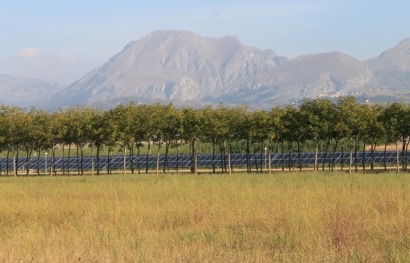
This message was heard by representatives of European politics, businesses and organisations at a high-level panel debate in the European Parliament on 10 May hosted by Amalia Sartori, a Member of the European Parliament and Chair of the Industry, Research and Energy (ITRE) Committee. The panellists discussed the financial and social potential of solar energy for European citizens, the best policies to stimulate further growth in availability and usage of solar energy in Europe, and how solar energy can help in meeting the EU’s energy and climate objectives.
In an opening speech delivered on behalf of Ms. Sartori, the Vice-Chair of the ITRE Committee, Patrizia Toia said: “Today the economic crisis is at the top of everyone's mind, but this should not cause us to forget the pressing climate and energy challenges. Solar energy is important to help meeting the EU 2020 targets, and to overcome the crisis, creating jobs and innovation in Europe."
"Renewables – in particular solar energy – will undoubtedly play an increasingly important role in the European energy mix. They become even more important in light of the Energy Roadmap 2050 and the European Renewable Energy Strategy. Given that on average more than 50% of the energy consumed in Europe is imported, solar energy will also contribute to the EU’s energy independence,” Toia concluded.
The panel included Bruno Vanderschueren, Director General and Co-founder of Lampiris, the 100% green energy provider in Belgium; Pirita Lindholm, Member of the Covenant of Mayors Office and Head of Climate Alliance Brussels; Maud Skäringer, Policy Analyst-Policy Coordination, European Commission DG Regional Policy; Boris Klebensberger and Fabrice Didier, board members of the European Photovoltaic Industry Association (EPIA); and Nigel Cotton and Arthur de Vries, board members of the European Solar Thermal Industry Federation. The group discussed the best ways to support consumers in adopting solar energy technologies.
"Solar energy has huge potential to reduce CO2 emissions and decrease energy costs for European households. We can't take our foot off the pedal now. We are on track to meet our energy targets for 2020 but we need to define new targets for 2030 to maintain the high level of motivation and the fast growth of solar energy", said Reinhold Buttgereit, EPIA Secretary General.
Stressing the importance of investing in decentralised energy production to promote economic growth, Xavier Noyon, ESTIF Secretary General, added: "Decentralised energy sources such as solar thermal and solar photovoltaics have an important role to play in promoting investment at local level, i.e. commercialisation, installation and maintenance. It’s a great way to replace fossil fuel imports by local jobs:"
By the end of 2011, over 50 gigawatts of PV systems and 26 gigawatts (solar thermal energy) had been installed in Europe - enough to supply electricity to over 15 million households and provide domestic hot water to 12.5 million households with an average sized solar thermal system.
For additional information:

